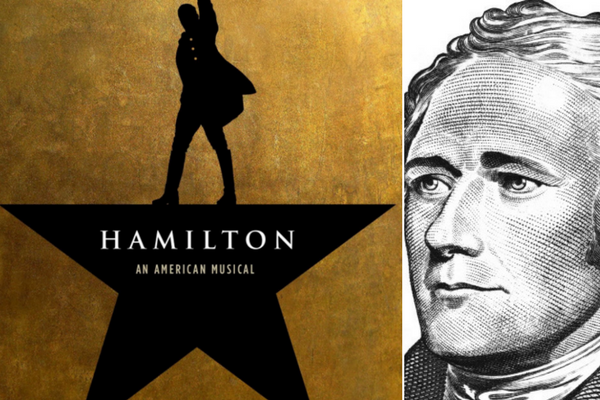HAMILTON is a scrappy young immigrant who defies all expectations to become one of America’s most important political figures. However, we probably didn’t take in every single historical reference the show has to offer. Here are 5 Hamilton one-liners with a secret meaning...
After what feels like decades of ‘waiting for it’, the Broadway smash-hit musical Hamilton has crossed the Atlantic. The musical packs more than 20,000 words into two and a half hours, making it almost impossible to catch every single historical reference in one sitting ... Of course, we got the big bits.
1. When you’re gone, I’ll go mad – King George, You’ll Be Back
Depending on how much attention they paid in history classes at school, Brits may remember King George III for one particular reason – he went mad. Hamilton references this a number of times in lyrics, twice in ‘You’ll Be Back’ and once, with the use of the word ‘Insane’ in ‘What Comes Next.’
The use of the word ‘mad’ has a double meaning just for us Brits. In America, ‘mad’ simply means ‘angry’, rather than implying anything about someone’s mental wellbeing. So there we go, a British Easter Egg.
For an added bonus, Hamilton even dares have George declare ‘I’m so blue’ – a reference to the fact that while he was insane, the King’s urine turned blue.
2. Laurens, I like you a lot - Alexander Hamilton, My Shot
Spend any amount of time in the fandom (or with a history book, but let’s be honest here), and you’ll learn that historians debate the nature of John Laurens’ and Alexander Hamilton’s relationship.
Judging by the letters the pair wrote to each other, they have every right to suggest these two might have been more than comrades. In one letter, Hamilton writes: “You should not have taken advantage of my sensibility to steal into my affections without my consent.” In others, he makes jokes about the size of his genitals and invites Laurens to a threesome with his new wife, Eliza.
The nod to the possibility of a Laurens/Hamilton relationship was confirmed by creator Lin Manuel Miranda in 2015 ... FOLLOW THE LINK HERE!
3. Sally, be a lamb – Thomas Jefferson, What’d I Miss?
The use of the name ‘Sally’ in Thomas Jefferson’s introductory number isn’t random – it was the name of his wife’s sister, his slave and lover.
Sally Hemings was the half-sister of Jefferson’s wife Martha, the daughter of Martha’s father. As the daughter of a slave, Sally too was born into slavery and remained Jefferson’s slave throughout his life. After Martha’s death, Jefferson embarked on a long-term affair with Sally, probably fathering her six children.
The Hemings family were confirmed to be the descendants of Jefferson in 2012, when a DNA test proved the two families were genetically linked. Given this and the documented evidence, the Smithsonian Institution and the Thomas Jefferson Foundation “strongly supports” the conclusion that Thomas Jefferson was the father of Sally Hemings’s children.
4. It’s Ben Franklin with a key and a kite – Angelica Schuyler, Satisfied
This obscure reference is easy to miss in the top-notch Angelica rap in ‘Satisfied’, but it actually refers to an experiment conducted by founding father Benjamin Franklin in 1752.
The experiment aimed to prove the electrical nature of lightning. It connected a house key by a wet hemp string to a Leyden jar, which was attached by a dry silk string to a kite. The Leyden jar acted as a capacitor, storing electrical energy. The hemp string was wet to conduct electricity, while the silk string was dry to prevent the person flying the kite from being electrocuted.
In short, what Angelica means is the immediate connection between Hamilton and herself was electric, like being struck by lightning.
5. I’ll be Socrates, throwing verbal rocks at these mediocrities - Alexander Hamilton, Non-Stop
The name Socrates will be familiar to most as the classical Greek philosopher. Unlike Alexander Hamilton, Socrates did not personally write down any of the ideas often attributed to him. Most of what is referred to as Socratic dialogues were instead written by his students, Plato and Xenophon.
These dialogues used Socrates as a main character to discuss moral or philosophical questions. The standard structure would have Socrates present himself as a simple man eager to learn the moral viewpoint of another person. After hearing their thoughts, Socrates would turn the dialogue on its head - often savagely - revealing the flaws and inconsistencies in the views of the other person.
This, of course, sounds exactly like Mr Hamilton.


































